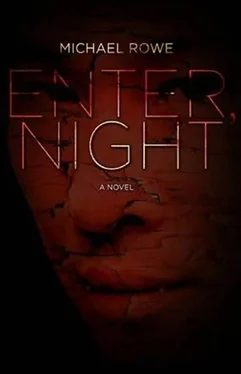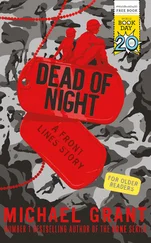The exhaustion of the past week on the water, coupled with my ordeal of abandonment by the Indians, had exhausted me beyond endurance and I fell deeply asleep before I could say any prayers for my own safety and protection during the night.
And then, there was a hand on my shoulder, shaking me gently awake. I opened my eyes. In the glow of the embers in the fireplace I beheld the figure of a pale old man bending over me, dressed entirely in the black robes of the Jesuit.
My eyes widened in disbelief and for a moment I wondered if I was beholding a ghost, merely one more in a long line of nightmarish sights in this godforsaken Land.
The figure lovingly caressed my face. His fingers felt cold, as though he had just come in from outside. He pulled back the blanket and lifted my robe, exposing my leg where the child had bitten me. This he touched, tracing the injury with his finger, gently, as though he were a surgeon inspecting an infected wound. Then he leaned down and kissed me on both cheeks, a chaste kiss of welcome.
“You have found us,” he said in French-the first proper French I had heard since leaving Trois-Rivières. His voice was cultured, even aristocratic, a far cry from the coarse guttural peasant French of the voyageurs and hivernants in Trois-Rivières. “Praise God. I had given up hope that anyone would. I have been waiting for so very long.”
I struggled to sit up. Through eyes suddenly full of tears of joy and relief, I said, “Father de Céligny? Can it really be you?” I grasped his arms, finding them solid and real, not spectral. “I-we, all of us in TroisRivières-we feared you had been killed by the Hiroquois.”
“Yes, Father,” he replied. “I am de Céligny. I am not dead. Now, rest. We will speak tomorrow. All is well. You are safe, here, from harm. Sleep, now.”
“But the Hiroquois…”
My eyelids were heavy. I heard Father de Céligny’s voice as from a great distance, urging me to sleep. I tried to open my eyes, and with seemingly superhuman strength, I half-raised my lids to see him drawing away into blackness as he stepped from my bedside. I saw the glint of reflected firelight in his eyes, and then he was gone.
I closed my eyes and fell into a deep sleep. I dreamed of the young girl in the lake with the torn throat.
In my dream, her eyes were not opaque and lightless; they sparkled with bright black life. I looked to the Indians for succour, but found I was alone in the canoe, floating on an endless ocean of ash-coloured water with no land or horizon anywhere in sight. As I stared, trying desperately to scream and being unable to, her throat healed itself before my eyes until there was no mark or blemish anywhere on the wet bronze skin.
The dead girl swam up to the canoe, drifting snakelike through the water, her wet black hair plastered to her head and face. She reached up and grasped the gunwale of the canoe and began to rock it gently, and then with increasing violence. I believed she meant to swamp it and drown me, pulling me beneath the surface to live there with her there for a thousand years.
“You have brought terrible things here with you,” she said in a voice full of cold dark water and rotted black pine needles. Her voice was the voice of Askuwheteau, my Judas-abandoner. “You have brought death, and worse.” Then she opened her mouth to smile, and I saw her terrible teeth.
I woke myself with the sound of my own screams.
In the weak daylight that crept through the windows and under the doors of that haunted place, I wondered if I had only dreamed the appearance of Father de Céligny, for the door was still crudely barred from the inside, just as I had left it before falling asleep. Otherwise, the room was undisturbed. The windows were likewise barred and there were no tracks in any direction upon the floor other than my own. From outside came the sound of the trees shuddering with rain.
I touched the side of my face. I could still feel the imprint of the priest’s cold fingers on my cheek. If that was a dream, I told myself, it had been a most vivid and realistic one. Were dreams even dreams in this evil place, where the legends spoke of the dead walking in the forest, going about as they had when they were living? Or were they auguries, visions, or portents? I thought of my dream of the smiling dead girl in the water and I shuddered.
After a Spartan breakfast and an hour of prayer, I set out to find Father de Céligny, if only to prove to myself that I hadn’t been dreaming. While there was no evidence of him anywhere in the building, I believed in my heart that he was real and that I had not been dreaming. The puzzle of the door barred from the inside was one I would consider later, I told myself. So eager was I to believe I was not the only living soul in St. Barthélemy, I was prepared to overlook even the evidence of my own senses.
But if he were nowhere in the buildings, he must be nearby, perhaps in some secondary domicile, or perhaps dwelling among the Indians away from the village itself, however unlikely that seemed. I knew, for instance, that the Indians liked to visit our homes in the settlements, that they were attracted to objects of mystery to them, our crucifixes, our books, our writing instruments, and our clocks. But I had not seen them even in their own houses here, so why would they be elsewhere in the forest?
A cold rain was indeed falling outside, mining the ground with puddles. I covered my head with a shawl against the rain and set out to explore the area for some sign of where Father de Céligny might have taken shelter.
My intention had not been to wander too far from the village, for after inspecting every house I was able to ascertain that there was no human habitation at all within its confines and it did, indeed, appear to have been abandoned.
But my source of primary bafflement remained the lack of evidence of any kind of struggle or bloodshed. There were no bodies, obvious graves, no stains. As I have already written, nothing had been burned. I inspected every house, first tentatively and then with more boldness as I realized I was entirely alone. So the mystery remained, surely an entire village could not have simply vanished into thin air? Or, for that matter, migrated to some other part of this land, leaving behind their belongings, including weapons and cooking utensils?
Slowly and carefully I took my leave of the village and began walking towards the lake. The rain had not diminished. On the contrary, it fell in colder and more punishing sheets, seemingly with every step I took away from the settlement, into the forest and towards the lake.
I had been walking perhaps a half-hour and had almost reached the rocky hills above the lake when I heard a sound that chilled me to the very marrow of my bones. It came from behind one of the boulders in my path, and it froze me in my tracks with a terror so primeval that it must surely have descended from generation to generation from Adam in the Garden of Eden, after the fall from Grace, when all wild things had become his enemy.
A giant grey wolf had stepped into my path, its back low and arched in a menacing posture. Its black lips were pulled back from the cruellooking yellow fangs. Again, the wolf growled low in its throat. The murderous intent of this monster could not have been clearer.
To my horror, it was joined by another, and yet another, until there were five of the creatures blocking my path, each more fearsome than the last. I had seen wolves in France, shot by hunters. They had always struck me as fearsome, but these wolves were larger and more terrifying than any European variant. And in their eyes, I could see only the muddy hatred of the human species and a fierce hunger for human flesh.
The wolves advanced slowly, and in terrible unison, maintaining the half-circle around me with the precision of a military phalanx formation, driving me backwards. My eyes never left theirs, nor theirs mine, as they slowly forced me away from the caves.
Читать дальше












